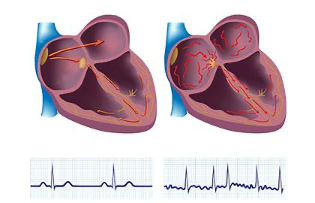Abstract: Atrial fibrillation, also known as AF, is one of the most common arrhythmias in clinic. During the attack of atrial fibrillation, the heart rate will be abnormally accelerated, which will affect the normal blood delivery of the heart, and can lead to a series of uncomfortable symptoms. Some serious patients will even be disabled or die. So, how is atrial fibrillation caused? What are its causes? What are the symptoms of AF and what are the hazards?

How is AF caused?
In a word, atrial fibrillation is caused by abnormal electrical activity of atrium due to fibrosis caused by various reasons, and most of them occur in left atrium due to anatomical characteristics. Generally, the occurrence of atrial fibrillation has experienced a development process of atrial premature contraction, atrial tachycardia, atrial flutter, paroxysmal atrial fibrillation and sustained atrial fibrillation. Of course, the pace of this process varies from person to person, some people may need decades, some people can reach the stage of persistent AF in a very short time. In general, if we live long enough, everyone has the possibility of atrial fibrillation. There are many causes of AF, including gene mutation, hyperthyroidism, coronary heart disease, hypertension, diabetes, cardiomyopathy and other diseases. Long term drinking, overwork, smoking and other common causes are also common. In general, the earlier the onset, the greater the relationship with gene variation.
In recent years, there are more and more AF caused by long-term drinking. This type of AF is difficult to treat, and even the effect of surgery is worse than those undrinking people. In clinical, most patients with AF often cannot find a single clear cause, which we define it as idiopathic AF. Atrial fibrillation also occurs in some patients at the early stage after cardiac surgery, which is often caused by cardiac surgery itself and may terminate with no recurrence for a long time.
What are the symptoms
The symptoms of AF vary from person to person. The most common is palpitation. Some people may feel chest tightness, shortness of breath or sweating. Some people will have polyuria, and then they will feel weak for a long time due to low potassium. But these symptoms change greatly. Many people often have symptoms in this attack, but next time it seems not obvious. Even some people (especially men) only occasionally find atrial fibrillation in routine physical examination or in medical test for other diseases. There is a common type of atrial fibrillation that presents slow heart rate in normal status, but relatively fast heart beats when AF occurs. We define it as the slow-fast syndrome. There are also some patients whose heart rate is basically normal but the heart beat stops for a few seconds when the atrial fibrillation starts to turn normal, or even causes fainting or blackness in front of them. The reason is that there are two atria, the right atrium has a sinoatrial node which is responsible for normal heartbeat. If there is fibrosis in the right atrium, the function of sinoatrial node will be reduced, sinus bradycardia or sinus arrest will occur, and the fibrosis in the left atrium will lead to atrial tachycardia, atrial flutter, atrial fibrillation, etc. Most patients with AF are prone to attack after fatigue, drinking and at night, but this attack mode is generally not fixed and is not important for diagnosis or treatment. Some patients think that the inducement and regularity of the disease is very important, but in fact, it is not very significant for the treatment.
The most serious harm of atrial fibrillation is cerebral infarction, also known as stroke. A few people may also suffer from heart failure, mostly due to the fast-ventricular rate during the AF attack, and present lack of breath, uneven lying, swelling of feet, etc. Clinically, some patients do not have obvious symptoms, and occasionally diagnose by physical examination, which is called asymptomatic atrial fibrillation. In a sense, asymptomatic atrial fibrillation may be more dangerous, as the asymptomatic status will delay an in-time treatment. Consequently, this condition will lead to a relative high possibility of stroke and heart failure is greater, and some patients may die or be disabled. It’s really a great pity.
